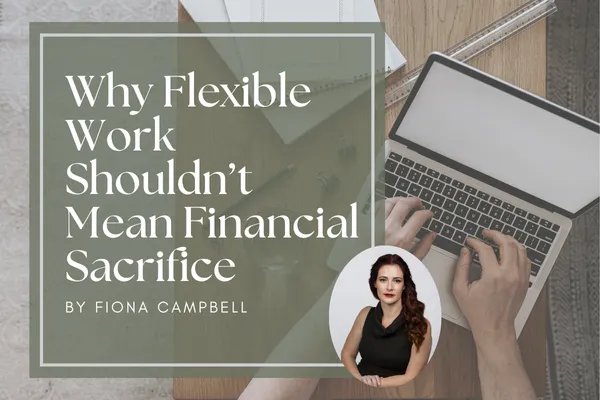
Why Flexible Work Shouldn’t Mean Financial Sacrifice
“Because flexibility isn’t freedom if it comes at the cost of your financial future.” - Fiona Campbell
For many mums, building your own business to gain flexible work as a contractor feels like the holy grail. Time with the kids, income on your terms, no commute, and space to build something of your own.
But here’s the truth no one tells you: if you undervalue yourself, “flexible” work can quickly turn into financial sacrifice, overwhelming stress and less time with your kids.
Let’s explore the three biggest traps you can fall into when setting your rates or saying yes to the wrong type of work, and how to avoid them.
1. Ignoring Superannuation (Future You Will Not Thank You)
When I first started out as a virtual assistant (VA), super was the last thing on my mind. It felt like a future problem.
I was so excited to land my first client that I let them haggle me down to a lower rate, which meant I didn’t have enough to contribute to my super. I was operating as a sole trader, so there was no obligation to pay myself super, and I told myself I’d “catch up later.” Spoiler: you can’t catch up on compound interest!
Not paying into super doesn’t just mean you’re missing out on today’s contributions.
It means you’re missing decades of compounding growth.
The gap adds up fast. I lost tens of thousands in contributions in just a few years, which will easily translate into hundreds of thousands less at retirement.
The lesson?
Even if you’re not obliged to pay yourself super as an independent sole trader contractor, you owe it to yourself (and your future family security) to treat it as non-negotiable.
If you’re classified as an employee contractor, rather than an independent contractor, then your clients are obligated to contribute to your superannuation (on top of your rates) and pay for a workers' insurance policy in your state.
Either way, factor super into your invoices, either by building it into your rate or listing it separately with your fund details.
And never let it be the thing you “skip this week.”
2. Undervaluing Your Work (Fair Pay Matters)
Too many mums set their contractor rates based on what they were earning as an employee, what they think someone will pay, or what they think others are charging. But as the Australian VA & OBM Rates Report shows, a fair contractor rate must cover the basics you get as an employee:
Casual loading, which increases the minimum wage for those employed on a casual basis
The Super Guarantee requires employers to pay superannuation to employees on top of wages and casual loading
Leave entitlements (holiday, sick, carer’s, etc.)
Insurances (workers’ compensation, professional indemnity, public liability, cyber, etc.)
Computer equipment and furniture
Standard software licenses
Phone and internet accounts
Contractor rates will be higher than employee wages, and that’s a good thing. If you’re charging less than minimum wage once overheads are factored in, you’re not running a business. You’re volunteering.
And remember, your price isn’t just about covering costs; you should not be aiming for the minimum wage reserved for entry-level work.
Your rates should signal your expertise, the value you bring to your clients, your boundaries, and the type of clients you attract.
3. Saying Yes to Commission-Only Roles (Don’t Do It)
If you’ve ever been pitched a “fantastic opportunity” where you’ll get paid a percentage of sales if and when they happen… run.
As I explained in my She Defined article, commission-only work is a huge red flag.
It transfers all the financial risk from the business to you. You end up doing unpaid admin, chasing results you can’t control, and waiting on money that may never arrive.
A real role will pay you fairly for your time and expertise, not on the hope of someone else’s sales funnel working.
All commission payments should be in addition to a fair base rate.
Flexible Work is Not a Fairy Tale
Flexible work with financial security does exist, and it can empower us mums instead of leaving us burnt out, broke, or worrying about retirement.
Protect yourself by:
Paying into super regularly, even as a sole trader contractor.
Charging rates that reflect all your costs and expertise.
Refusing commission-only roles that gamble with your time.
Because flexibility isn’t freedom if it comes at the cost of your financial future.
Author Bio
This article was written by Fiona Campbell, an automation and outsourcing consultant, virtual executive assistant and mum of three, helping hundreds of other mums in business to build sustainable, flexible careers without financial sacrifice.
She runs Thought Penny, a team of virtual assistants, and Virtual Assistant Lead Network, referred to by its users as ‘Seek’ for Australian virtual assistants and online business managers. Having worked remotely since 2013, she has helped hundreds of business owners optimise their systems, improve productivity and outsource effectively.
Connect with Fiona on Instagram or LinkedIn.
Listen to our Naptime Chat on The Coffee, Clients & Naptime Podcast:

